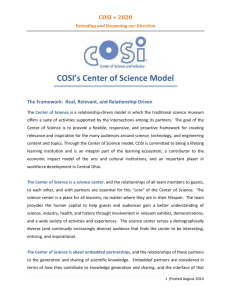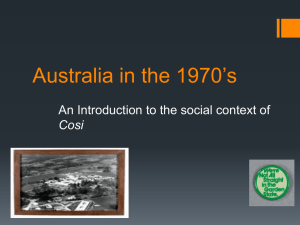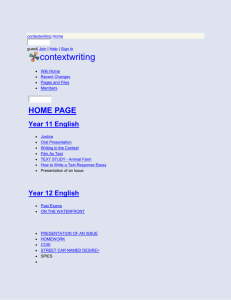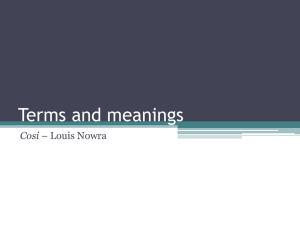Computer Science Department of 121
advertisement
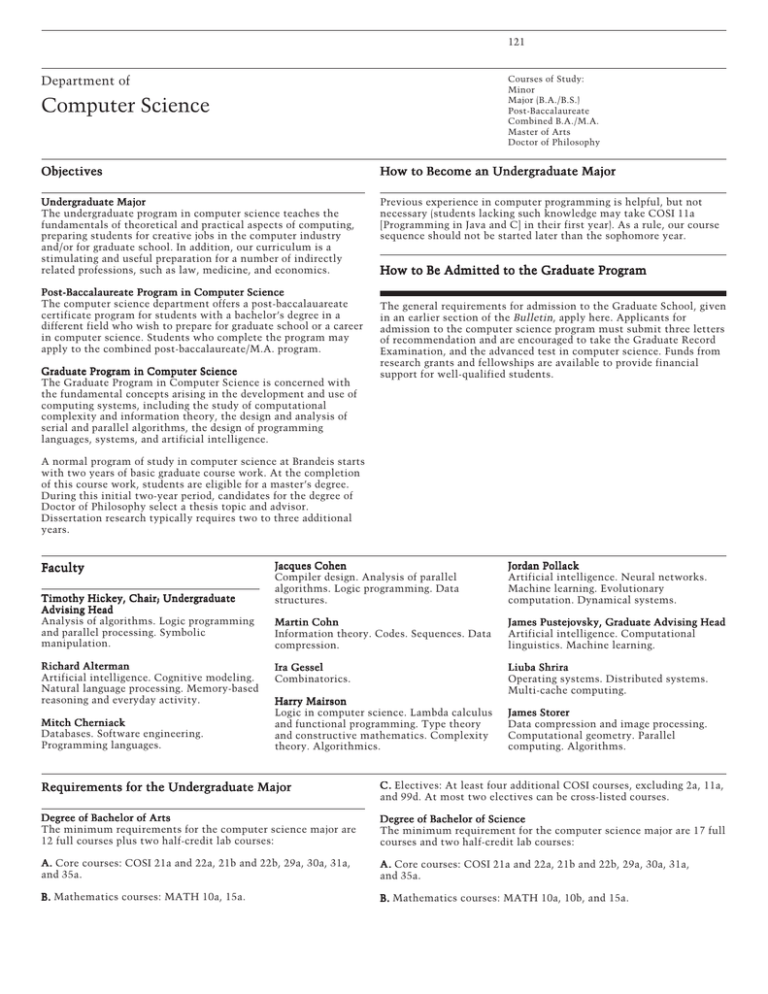
121 Courses of Study: Minor Major (B.A./B.S.) Post-Baccalaureate Combined B.A./M.A. Master of Arts Doctor of Philosophy Department of Computer Science Objectives How to Become an Undergraduate Major Undergraduate Major The undergraduate program in computer science teaches the fundamentals of theoretical and practical aspects of computing, preparing students for creative jobs in the computer industry and/or for graduate school. In addition, our curriculum is a stimulating and useful preparation for a number of indirectly related professions, such as law, medicine, and economics. Previous experience in computer programming is helpful, but not necessary (students lacking such knowledge may take COSI 11a [Programming in Java and C] in their first year). As a rule, our course sequence should not be started later than the sophomore year. Post-Baccalaureate Program in Computer Science The computer science department offers a post-baccalauareate certificate program for students with a bachelor’s degree in a different field who wish to prepare for graduate school or a career in computer science. Students who complete the program may apply to the combined post-baccalaureate/M.A. program. Graduate Program in Computer Science The Graduate Program in Computer Science is concerned with the fundamental concepts arising in the development and use of computing systems, including the study of computational complexity and information theory, the design and analysis of serial and parallel algorithms, the design of programming languages, systems, and artificial intelligence. How to Be Admitted to the Graduate Program The general requirements for admission to the Graduate School, given in an earlier section of the Bulletin, apply here. Applicants for admission to the computer science program must submit three letters of recommendation and are encouraged to take the Graduate Record Examination, and the advanced test in computer science. Funds from research grants and fellowships are available to provide financial support for well-qualified students. A normal program of study in computer science at Brandeis starts with two years of basic graduate course work. At the completion of this course work, students are eligible for a master’s degree. During this initial two-year period, candidates for the degree of Doctor of Philosophy select a thesis topic and advisor. Dissertation research typically requires two to three additional years. Faculty Timothy Hickey, Chair; Undergraduate Advising Head Analysis of algorithms. Logic programming and parallel processing. Symbolic manipulation. Richard Alterman Artificial intelligence. Cognitive modeling. Natural language processing. Memory-based reasoning and everyday activity. Mitch Cherniack Databases. Software engineering. Programming languages. Jacques Cohen Compiler design. Analysis of parallel algorithms. Logic programming. Data structures. Jordan Pollack Artificial intelligence. Neural networks. Machine learning. Evolutionary computation. Dynamical systems. Martin Cohn Information theory. Codes. Sequences. Data compression. James Pustejovsky, Graduate Advising Head Artificial intelligence. Computational linguistics. Machine learning. Ira Gessel Combinatorics. Liuba Shrira Operating systems. Distributed systems. Multi-cache computing. Harry Mairson Logic in computer science. Lambda calculus and functional programming. Type theory and constructive mathematics. Complexity theory. Algorithmics. James Storer Data compression and image processing. Computational geometry. Parallel computing. Algorithms. Requirements for the Undergraduate Major C. Electives: At least four additional COSI courses, excluding 2a, 11a, and 99d. At most two electives can be cross-listed courses. Degree of Bachelor of Arts The minimum requirements for the computer science major are 12 full courses plus two half-credit lab courses: Degree of Bachelor of Science The minimum requirement for the computer science major are 17 full courses and two half-credit lab courses: A. Core courses: COSI 21a and 22a, 21b and 22b, 29a, 30a, 31a, and 35a. A. Core courses: COSI 21a and 22a, 21b and 22b, 29a, 30a, 31a, and 35a. B. Mathematics courses: MATH 10a, 15a. B. Mathematics courses: MATH 10a, 10b, and 15a. 122 Computer Science C . Two cross-listed courses from other departments (students should consult the individual course entries for prerequisites, corequisites, and special notes) to take the introductory and mathematics courses in Summer School and then complete the remaining core and elective courses during the following academic year. D. Electives: At least six additional COSI courses, excluding COSI 2a, 11a, and 99d. At most two of these can be cross-listed courses. Requirements for the Degree of Master of Arts Honors Graduation with honors in computer science requires completion and defense of a Senior Honors Thesis; students considering this option should take note of the prerequisites for enrollment in COSI 99d (Senior Research). Course Requirements Satisfactory completion of an approved schedule of nine courses numbered 100 or above, which generally must include at least two courses from each of the following groups: Combined B.A./M.A. Program Available only to Brandeis students who have completed all requirements for the undergraduate B.A. degree and have performed well in the computer science major. Students should apply in their senior year, at which time they should propose a course of study for the fifth year that typically consists of six graduate-level courses, which may include independent study. Requirements for the Minor in Computer Science A. Demonstrated ability to program in C, or COSI 11a. A. AI Group: COSI 111a, 112a, 113b, 114b, 120a, 125a, 200a, 200b, 210a, 210b, 215a, 216a, 217a, 300a, 300b. B. Languages and Systems Group: COSI 120a, 127b, 140a, 146a, 147a, 150a, 155b, 200a, 200b, 210a, 210b, 220a, 227b, 300a, 300b. C. Algorithms and Theory Group: COSI 120a, 160a, 170a, 171a, 175a, 180a, 188a, 190a, 200a, 200b, 210a, 210b, 240b, 300a, 300b. Residence Requirement The minimum residency requirement is one and a half years. Language Requirement There is no foreign language requirement. Requirements for the Degree of Doctor of Philosophy B. COSI 21a and 22a. C. COSI 21b and 22b. D. COSI 31a. E. One elective in computer science numbered higher than 20. Special Notes Relating to Undergraduates Students may submit a written request to count a course from another department to satisfy one of the required computer science electives. Approval of such a request is based on the relationship of this course to the student’s other computer science electives. Requirements for the Post-Baccalaureate Certificate in Computer Science A. Introductory courses: COSI 11a, 21a B. Core courses: COSI 21b, 22b, 29a, 30a, and 31a. C. Electives: At least four additional COSI courses, excluding 2a and 99d. At most two electives can be cross-listed courses. Combined Post-Baccalaureate/M.A. Program Available only to Brandeis students who have completed all requirements for the Post-Baccalaureate certificate. Students should propose a course of study that typically consists of six graduate-level courses, which may include independent study. Special Notes Relating to Post-Baccalaureate Students Post-baccalaureate students with a programming background may ask to be exempted from the introductory courses: COSI 11a, 21a. They may also submit a petition to replace core courses (in which they have previous work experience or study) with electives. Students with no previous background are encouraged Advisor By the end of the first year the student must obtain the consent of a computer science faculty member to serve as advisor and dissertation committee chair. Course Requirements The same as that for the Master of Arts. Teaching Requirement The mentoring, training, and evaluation of teaching fellows is an ongoing and important component of the Graduate Program in Computer Science. Students normally teach one course per year, beginning as graders of problem sets and assignments and move progressively to higher levels of involvement with teaching in courses across the curriculum. They participate in the design and delivery of course lectures and each year, under the guidance of their faculty, they present several lectures. Whether students are preparing for an academic and research career, or an industry position, the teaching fellow experience is valuable training in course preparation and technical communication. Thesis Committee and Proposal 1. Establishment by the advisor and the director of graduate studies of a thesis committee consisting of the advisor, two other Brandeis faculty, and one appropriate external member from outside Brandeis. 2. An approved, written thesis proposal by the candidate that surveys the relevant literature and states the goals of the dissertation and topics to be investigated (including aspects already completed or under way), along with an oral presentation to the thesis committee that is open to computer science faculty who wish to attend. Thesis Defense Public defense of a completed dissertation will be announced three weeks in advance. Copies of the complete thesis will be available to the faculty during these three weeks. Residence Requirement The minimum residency requirement is three years. Language Requirement There is no foreign language requirement. Computer Science Courses of Instruction (1-99) Primarily for Undergraduate Students COSI 2a Introduction to Computers [ sn ] An introduction to the basic principles underlying computer hardware and software and to the implications of the wider use of computers in society. Topics will include hardware, software, Web page design, applet and servlet programming, the Internet, privacy and security issues, as well as a survey of current research directions, including artificial intelligence and parallel computing. Usually offered every year. Will be offered in the fall of 2003. Mr. Hickey COSI 11a Programming in Java and C [ sn ] This course may be repeated for credit by students who have taken COSI 11a before spring 1998. A general introduction to structured programming and problem solving using C and Java, in the context of the World Wide Web. Students also learn GUI programming and advanced HTML authoring. There are weekly programming assignments. Computer science majors with adequate programming skills may wish to take COSI 21a directly. Usually offered every year. Will be offered in the spring of 2004. Staff COSI 21a Data Structures and the Fundamentals of Computing [ qr sn ] Prerequisite: COSI 11a or programming facility in C. Corequisite: COSI 22a. This course satisfies the quantitative reasoning requirement only when taken with the corresponding lab. An introduction to the fundamental concepts of computation: discrete structures (sets, relations, functions, sequences, graphs), the fundamental data structures and algorithms for sorting and searching (lists, queues, dequeues, heaps, hashing, binary trees, tries), and the analysis of algorithms (predicate logic, termination and correctness proofs, computational complexity). The associated laboratory course is COSI 22a. Usually offered every year. Will be offered in the fall of 2003. Mr. Storer COSI 21b Structure and Interpretation of Computer Programs [ qr sn ] Prerequisites: COSI 21a, 22a. Corequisite: COSI 22b. This course satisfies the quantitative reasoning requirement only when taken with the corresponding lab. An introduction to the fundamental models of computation: functional programming, abstract data types, imperative programming, object-oriented programming, data-driven programming, meta-linguistic 123 abstraction, and logic programming. The associated laboratory course is COSI 22b. Usually offered every year. Will be offered in the spring of 2004. Mr. Mairson COSI 22a Fundamentals of Programming Corequisite: COSI 21a. May yield halfcourse credit toward rate of work and graduation. Two semester hour credits. An introduction to the tools and techniques needed to design, construct, verify, analyze, and maintain programs. One afternoon a week and one, one-hour lecture a week. Usually offered every year. Will be offered in the fall of 2003. Mr. Storer COSI 22b Programming Paradigms Prerequisites: COSI 21a, COSI 22a. Corequisite: COSI 21b. May yield halfcourse credit toward rate of work and graduation. Two semester hour credits. A practical introduction to the use of appropriate computational paradigms and programming methodologies to solve complex problems. Problem domains vary from year to year but typically include numerical programming, symbolic computation, natural language processing, simulation of physical systems, interpretation and compilation of programming languages. One afternoon a week and one, one-hour lecture a week. Usually offered every year. Will be offered in the spring of 2004. Mr. Mairson COSI 29a Discrete Structures [ sn ] Covers topics in discrete mathematics with applications within computer science. Some of the topics to be covered include graphs and matrices; principles of logic and induction; number theory; counting, summation, and recurrence relations; discrete probability. Usually offered every year. Will be offered in the fall of 2003. Mr. Gessel COSI 30a Introduction to the Theory of Computation [ sn ] Prerequisites: COSI 21a,b; COSI 22a,b; COSI 29a. Formal treatment of models of computation: finite automata and regular languages, pushdown automata and contextfree languages, Turing machines and recursive enumerability. Church’s thesis and the invariance thesis. Halting problem and undecidability, Rice’s theorem, recursion theorem. Usually offered every year. Will be offered in the spring of 2004. Mr. Mairson COSI 31a Computer Structures and Organization [ sn ] Prerequisites: COSI 21a,b; COSI 22a,b. Processors, memories, and peripherals and their interactions. Fundamental structures of computers from logic gates and circuits, through machines and assembly language, to the overall structure of operating systems. Usually offered every year. Will be offered in the fall of 2003. Ms. Shrira COSI 33b Internet and Society [ sn ] Prerequisite: COSI 2a or COSI 21a. Enrollment limited to 300. A library intensive course. An interdisciplinary survey of the Internet. Taught by a team of professors from several different departments, the course content will vary from year to year. Some particular topics to be covered are the architecture of the Internet (and the implications this has on its regulation), intellectual property, privacy, censorship, e-commerce, online education, and research. Usually offered every year. Will be offered in the spring of 2004. Mr. Hickey COSI 35a Fundamentals of Artificial Intelligence [ sn ] Prerequisites: COSI 21a,b; 22a,b; COSI 29a. Survey course in artificial intelligence. Introduction to Lisp and heuristic programming techniques. Topics include problem solving, planning natural language processing, knowledge representation, and computer vision. Usually offered every year. Will be offered in the spring of 2004. Mr. Pollack COSI 98a Independent Study Signature of the instructor required. Open to exceptional students who wish to study an area of computer science not covered in the standard curriculum. Usually offered every year. Staff COSI 98b Independent Study Signature of the instructor required. Open to exceptional students who wish to study an area of computer science not covered in the standard curriculum. Usually offered every year. Staff COSI 99d Senior Research Prerequisites: Open only to seniors. A grade point average of 3.50 or higher in the major after completing spring semester of the junior year. Submission of a thesis proposal during the spring semester of the junior year. This proposal must be signed by a faculty member who has agreed to supervise the thesis. Research assignments and preparation of a report under the direction of an instructor. Usually offered every year. Staff 124 Computer Science (100-199) For Both Undergraduate and Graduate Students COSI 111a Topics in Computational Cognitive Science [ sn ] Prerequisite: COSI 35a. Focuses on the cognitive aspects of computer-mediated group problem-solving. Topics include computer-supported cooperative work, the role of convention in the coordination of activity, problemsolving and skill acquisition, adaptive systems, distributed cognition, and discourse. The laboratory work is designed to give the student practice with the ideas and techniques under discussion. Usually offered every year. Last offered in the spring of 2002. Mr. Alterman COSI 112a Theory and Models of Intelligent Behavior [ sn ] Prerequisites; COSI 21b or 29a; COSI 35a. Topics include logics for world modeling, representation of goals and plans, action theory, models of shared knowledge, learning theories for environmental modeling, and the social construction of concepts. Usually offered every third year. Last offered in the spring of 2000. Mr. Pustejovsky COSI 113b Machine Learning [ sn ] Prerequisite: COSI 35a. A seminar on genetic algorithms, genetic programming, evolutionary programming, blind watchmaking, and related topics, ultimately focusing on co-evolutionary spirals and the automatic construction of agents with complex strategies for games. Usually offered every second year. Last offered in the fall of 2002. Mr. Pollack COSI 114b Topics in Computational Linguistics [ sn ] Prerequisites: COSI 21b or 29a; COSI 35a. Provides a fundamental understanding of the problems in natural language understanding by computers, and the theory and practice of current computational linguistic systems. Of interest to students of artificial intelligence, algorithms, and the computational processes of comprehension and understanding. Usually offered every year. Will be offered in the fall of 2003. Mr. Pustejovsky COSI 117a Languages and Complexity [ sn ] Prerequisites: COSI 21b and COSI 30a. Enrollment is limited to 20. An introduction to how complexity theory and programming languages are linked. Studies are compilers analyze the complexity of programs. How various constructs add to the expressibility of prgramming languages is studies in detail also. Special one-time offering. Will be offered in the fall of 2003. Mr. Neergaard COSI 120a Topics in Computer Systems [ sn ] Prerequisite: COSI 21a. Content will vary from year to year. May be repeated for credit. Prerequisites may vary with the topic area; check with instructor for details. Usually offered every third year. Last offered in the fall of 2000. Staff COSI 125a Human Computer Interaction [ sn ] Prerequisite: COSI 21b. Covers the basic theory and concepts of human-computer interaction. Topics include methodologies for designing and testing user interfaces, interaction styles and techniques, design guidelines, intelligent user interfaces, hypermedia, adaptive systems, information search and visualization, and computer supported cooperative work. The laboratory work is designed to give the student practice in a set of basic techniques used in the area of human-computer interaction. Usually offered every second year. Last offered in the fall of 2002. Mr. Alterman COSI 127b Database Management Systems [ sn ] Prerequisites: COSI 21a, 22a, and 29a. Introduces database structure, organization, and languages. Studies relational and object-oriented models, query languages, optimization, normalization, file structures and indexes, concurrency control and recovery algorithms, and distributed databases. Usually offered every second year. Last offered in the fall of 2002. Mr. Cherniak COSI 128a Modern Database Systems [ sn ] Prerequisite COSI 127b. Covers advanced topics in database systems such as concurrency control, recovery, security, and data mining. Usually offered every fourth year. Last offered in the spring of 2002. Mr. Cherniak COSI 140a Logic Programming [ sn ] Prerequisite: COSI 31a Studies the relationship of Prolog to predicate calculus, horn clauses, unification algorithms, intelligent backtracking, infinite trees, inequalities, implementation issues, and concurrent Prolog. Usually offered every second year. Last offered in the fall of 2001. Mr. Cohen COSI 146a Fundamentals of Operating Systems (formerly COSI 46a) [ sn ] Prerequisites: COSI 21a,b; 22a,b; 31a; MATH 10a (MATH 10b recommended). This course may not be repeated for credit by students who have taken COSI 46a in previous years. Design of systems that share resources. Specific topics: naming, binding, protection, reliability, synchronization, scheduling, storage allocation, interprocess communication. Usually offered every second year. Last offered in the spring of 2001. Staff COSI 147a Networks and Distributed Computing [ sn ] Prerequisite: COSI 31a or the equivalent, 146a, C/C++/UNIX programming skills. Introduces state-of-the-art networking technologies, architectures, and protocols, with an emphasis on the Internet and the World Wide Web. Specific topics include naming and RPC at the application level, TCP/IP and UDP/IP at the transport/ network levels, and Ethernet, ATM, FDDI, and wireless technologies at the physical level. Usually offered every second year. Last offered in the spring of 2002. Ms. Shrira COSI 155b Computer Graphics [ sn ] An introduction to the art of displaying computer-generated images and to the design of graphical user interfaces. Topics include graphic primitives; representations of curves, surfaces, and solids; and the mathematics of two- and three-dimensional transformations. Usually offered every third year. Will be offered in the fall of 2003. Staff COSI 160a Parallel Computing and Programming [ sn ] Prerequisites: COSI 29a and 31a. An introduction to parallel computation at the levels of architecture, communication, data structures, algorithms, analysis, programming models, and programming languages. Usually offered every second year. Last offered in the spring of 2001. Staff Computer Science COSI 170a Information Theory and Coding [ sn ] Prerequisites: COSI 29a and 30a, MATH 10a. Information theory as applied to the problems of rewriting digital data to be more concise, more error-resistant, or more appropriate to physical environments. Usually offered every second year. Last offered in the spring of 2002. Mr. Cohn COSI 171a Cryptology: Cryptography and Cryptanalysis [ sn ] Prerequisites: COSI 21a and 29a. The study of data secrecy, privacy, and security. How can information be encoded so that an adversary can neither alter it, forge it, nor gain any knowledge of it? Usually offered every second year. Last offered in the fall of 2002. Mr. Cohn COSI 175a Data Compression and Multimedia Processing [ sn ] Prerequisites: COSI 21a, 29a, 30a, and 31a. Selected topics in data compression and image and video processing, including adaptive lossless compression, lossy image and video compression, transformations on image and video, multimedia retrieval problems, parallel algorithms. Usually offered every second year. Last offered in the fall of 2002. Mr. Storer COSI 178a Computational Molecular Biology [ sn ] Prerequisites: COSI 11 and COSI 30a. COSI 30a must be taken before or concurrently with this course. An overview of basic concepts in molecular biology, algorithmic coverage of pattern matching, strings, graphs, fragment assembly of DNA, physical mapping of DNA, phylogenetic tree reconstruction, detection of introns and exons, formal language view of DNA, and biological computers. Usually offered every third year. Last offered in the fall of 2000. Mr. Cohen COSI 180a Algorithms [ sn ] Prerequisites: COSI 21a,b, and 29a. This course may not be repeated for credit by students who have taken COSI 30b in previous years. Basic concepts in the theory of algorithm design and analysis, including advanced data structures and algorithms, parallel algorithms, and specialized topics. Usually offered every second year. Last offered in the fall of 2001. Mr. Cohn 125 COSI 190a Introduction to Programming Language Theory [ sn ] Prerequisite: COSI 21a or familiarity with a functional programming language, set theory, and logic. Lambda calculus and combinatory logic: Church-Rosser theorem, continuity and computability, denotational semantics, model theory. Typed lambda calculi: strong normalization, representability, completeness of equational reasoning, Curry-Howard isomorphism. Introduction to ML: polymorphism and type inference, module system. Category theory: categorical combinators and compilation, continuations, monads. Usually offered every second year. Last offered in the fall of 2001. Mr. Mairson (200 and above) Primarily for Graduate Students COSI 200a and b Readings Specific sections for individual faculty members as requested. Staff COSI 210a Independent Study Signature of the instructor required. Usually offered every year. Staff COSI 215a Advanced Topics in Artificial Intelligence Topics vary from year to year. The course may be repeated with the approval of the instructor. Usually offered every second year. Last offered in the fall of 2001. Staff COSI 216a Topics in Natural Language Processing Prerequisite: COSI 35a Reviews recent trends in computational approaches to linguistics, semantics, knowledge representation for language, and issues in parsing and inferences. Usually offered every fourth year. Last offered in the fall of 1999. Mr. Pustejovksy COSI 217a Topics in Adaptive Systems Prerequisite: COSI 35a. In nature, systems with greater complexity than any designed by humans arise without a designer. The central question explored is: How can complex modular organization arise without an intelligent designer? Class reads about theories of organization in different settings and scales (cells, brains, minds, behavior, society, economies), and study papers, models, and algorithms from a variety of fields that might shed light on the issue. Usually offered every third year. Last offered in the spring of 2000. Mr. Pollack COSI 227b Advanced Topics in Database Systems Prerequisite: COSI 127b. An in-depth treatment of advanced topics in database management systems. Topics vary from year to year and may include distributed databases, query processing, transaction processing, and Web-based data management. Usually offered every second year. Last offered in the spring of 2001. Mr. Cherniack COSI 240b Computational Logic Prerequisite: Some previous exposure to logic, computation theory, and functional programming. An introduction to logic in computer science. Propositional and first-order logic: completeness, compactness, unification and resolution theorem proving, and circuit and query complexity. Intuitionistic logic: Curry-Howard isomorphism, normalization, Kripke models, and double-negation embeddings. Higher-order logic: Godel’s “dialectica” theorem, program synthesis, and decision problems. Usually offered every second year. Last offered in the fall of 2002. Mr. Mairson COSI 300a and b Master’s Project Offered every year. Staff COSI 310a Seminar in Artificial Intelligence Usually offered every second year. Staff COSI 310b Seminar in Artificial Intelligence Usually offered every second year. Staff COSI 315b Current Topics in Learning and Neural Nets Usually offered every second year. Staff COSI 340a Seminar in Programming Languages Usually offered every second year. Staff COSI 390a Seminar in Theory of Computation Usually offered every second year. Staff COSI 400d Dissertation Research Specific sections for individual faculty members as requested. Staff 126 East Asian Studies Cross-Listed Courses MATH 30a Introduction to Algebra NBIO 136b Computational Neuroscience BCHM 170b Bioinformatics MATH 30b Introduction to Algebra NPSY 137b Cognitive Modeling BCHM 171b Protein X-Ray Crystallography MATH 36a Probability PHYS 29a Electronics Laboratory I CHEM 111a Computational Chemistry MATH 38b Number Theory PHYS 29b Electronics Laboratory II LING 130a Semantics: The Structure of Concepts MATH 39a Introduction to Combinatorics PHYS 32b Microprocessor Laboratory An interdepartmental program Courses of Study: Minor Major (B.A.) East Asian Studies Objectives How to Become a Major or a Minor East Asian studies is an interdisciplinary program that seeks to give the student broad yet intimate knowledge of East Asian civilization. It can be taken either as a major or a minor. At the crux of the program is the language requirement of an East Asian language, providing the basis for postgraduate study or careers dealing with East Asia. To enroll in the program, either as a major or a minor, students must see the program chair. Together they will select as an advisor a faculty member who seems best suited to that student’s interest and area of future work. Committee Richard Lyman (History) Isabel Seliger (Romance and Comparative Literature) Chair TBA Ellen Schattschneider (Anthropology) Mireya Solis (Politics) Qun Ao (German, Russian, and East Asian Languages and Literature) John Schrecker (History) Ralph Thaxton (Politics) Donald Hindley (Politics) Hiroko Sekino (German, Russian, and East Asian Languages and Literature) Aida-Yuen Wong (Fine Arts) Gary Jefferson (Economics) Requirements for the Major C. The EAS core course, HIST 80a (Introduction to East Asian Civilization). A. Satisfactory completion of at least 10 semester courses from among the EAS and cross-listed offerings. No course with a grade below C- can count towards the major requirement of 10 courses. It is expected that at least five of the courses used to fulfill the major will be taken in residence at Brandeis. D. From the EAS or cross-listed offerings: B. Completion of the 40 level or its equivalent in Chinese or Japanese. Students who can demonstrate this level of competence in another East Asian language may use it to fulfill the requirement. Note that in a student’s first East Asian language, no course below the 40 level may count toward the 10 required courses for the major. However, if a student has achieved the 40 level in one language, courses in additional East Asian languages at or above the 20 level may count toward the 10. For further information on these language requirements, see the undergraduate advising head. At least one course in the social sciences (in addition to HIST 80a) and at least one course in the humanities or creative arts. An additional course in either the social sciences (other than HIST 80a) or in the humanities or creative arts. E. Candidates for honors are required to register for EAS 99d or for a 99d in an appropriate department and to prepare an honors thesis on a topic relating to East Asia. If completed successfully, the 99d (a yearlong two-semester course) can be counted as two of the 10 courses of the major. East Asian Studies 127 Requirements for the Minor B. The EAS core course, HIST 80a (Introduction to East Asian Civilization). A. Completion of the 40 level or its equivalent in Chinese or Japanese. Students who can demonstrate this level of competence in another East Asian language may use it to fulfill the requirement. For further information on these language requirements, see the undergraduate advising head. C. At least three additional courses from the EAS or cross-listed offerings. These three courses must be in at least two different departments. Courses of Instruction CHIN 20b Continuing Chinese FA 12a History of Asian Art (1-99) Primarily for Undergraduate Students CHIN 30a Intermediate Chinese FA 13b Buddhist Art CHIN 40b Advanced Intermediate Chinese FA 15b Arts of the Ming Dynasty JAPN 10a Beginning Japanese FA 181b The Art of Japan JAPN 20b Continuing Japanese FA 182a The Art of China JAPN 30a Intermediate Japanese FA 184a Studies in Asian Art JAPN 40b Advanced Intermediate Japanese HIST 80b East Asia: Nineteenth Century to the Present (China and Japan) EAS 98a Independent Study Signature of the instructor required. Usually offered every year. Staff EAS 98b Independent Study Signature of the instructor required. Usually offered every year. Staff EAS 99d Senior Research Signature of the instructor required. Seniors who are candidates for degrees with honors in East Asian studies must register for this course and, under the direction of a faculty member, prepare an honors thesis on a suitable topic. Usually offered every year. Staff (100-199) For Both Undergraduate and Graduate Students EAS 175a Masterpieces of Chinese Literature (formerly COML 175a) [ hum ] This course may not be repeated for credit by students who have taken COML 175a in previous years. Surveys Chinese literature from the classical era through the 18th century. Readings are in English translation and include a wide range of genres, with particular emphasis on the great Chinese novels. Usually offered every third year. Last offered in the fall of 2000. Staff Core Courses CHIN 10a Beginning Chinese HIST 80a Introduction to East Asian Civilization Elective Courses The following courses are approved for the program. Not all are given in any one year. Please consult the Course Schedule each semester. CHIN 98a Readings in Modern Chinese CHIN 98b Readings in Modern Chinese CHIN 105a Advanced Conversation and Composition I COML 125a Introduction to East Asian Literature COML 150b Japanese Women Writers EAS 175a Masterpieces of Chinese Fiction ECON 165a The Economy of China ECON 175a Introduction to the Economics of Development HIST 176a The Emergence of Modern Japan HIST 180b Topics in Modern Chinese History HIST 181a Seminar on Traditional Chinese Thought JAPN 98a and b Readings in Japanese JAPN 105a Advanced Conversation and Composition I PHIL 119b Chinese Philosophy POL 133a Japanese Political Economy POL 147a The Government and Politics of China POL 148a Seminar: Contemporary Chinese Politics POL 150a Politics of Southeast Asia
